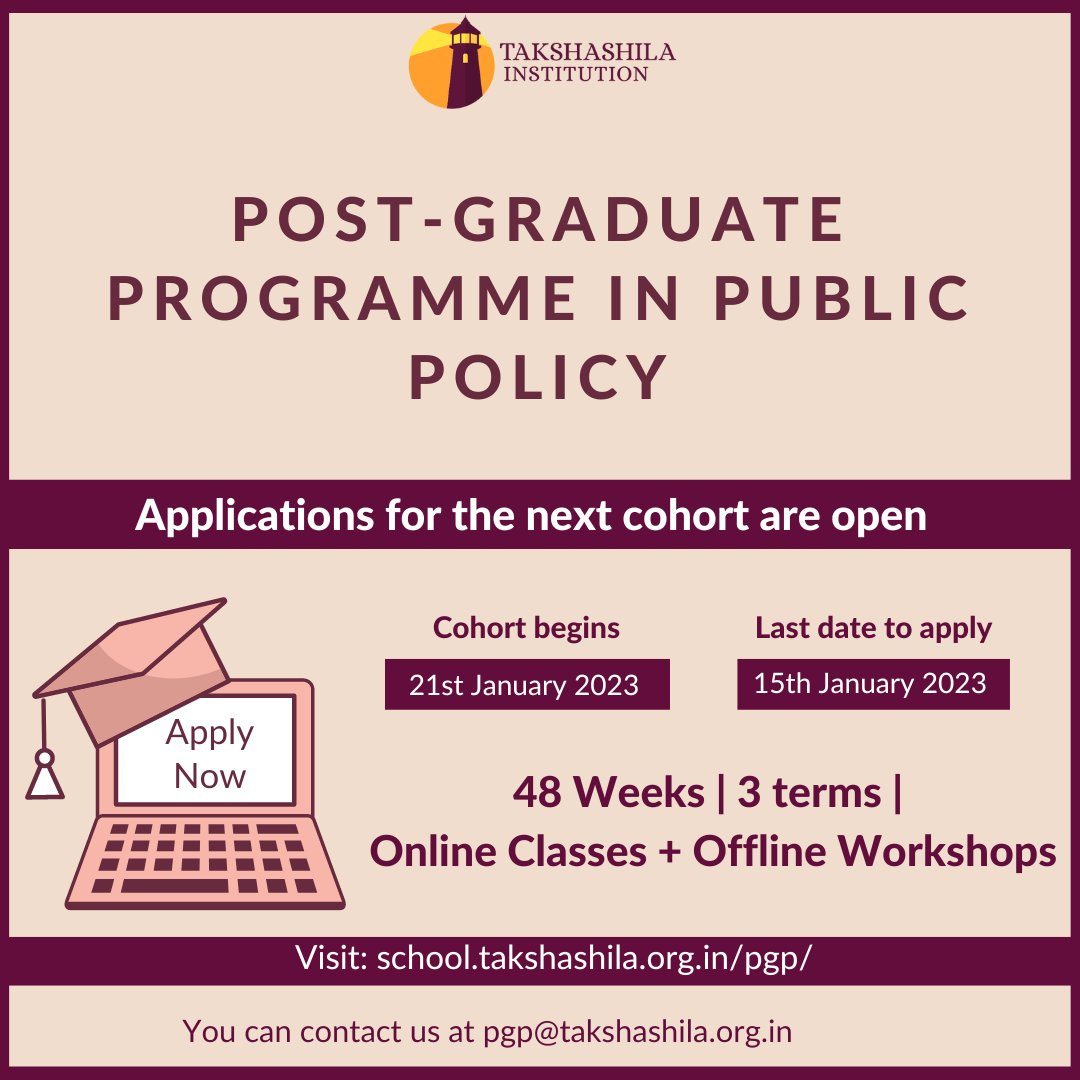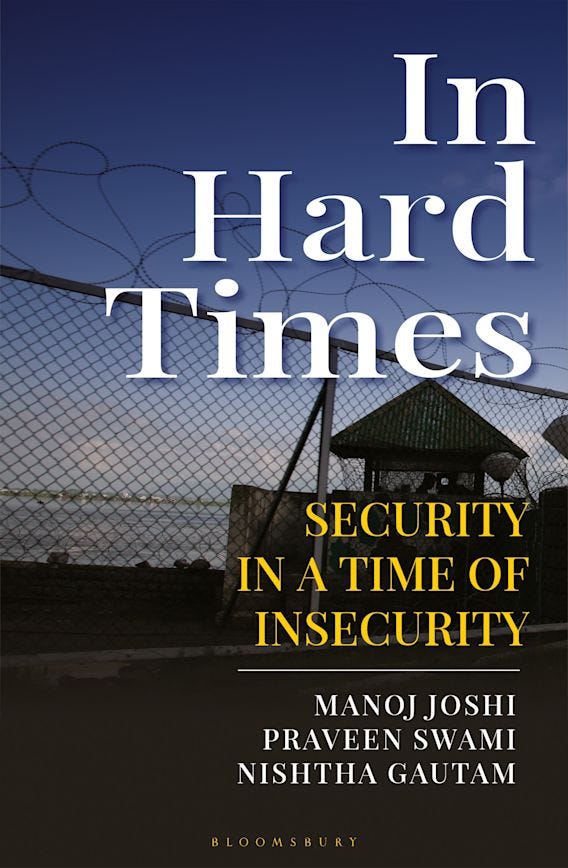Applications for PGP Programme are Now Open
Dear Reader,
Wish you a very happy Diwali!
In this edition of the Takshashila Dispatch, we bring you our work on defence financing & national security strategy, the role of nuclear submarines in India’s nuclear triad, India’s opportunity in the game of chips, reforming India’s drug regulator, Supreme Court of India’s recent ruling on abortion rights, and the updates from last week’s Takshashila-Hudson panel discussion.
Applications for PGP Programme are Now Open
The Post-Graduate Programme in Public Policy (PGP Programme) is a 48-week multi-disciplinary, specialised programme, designed for students who wish to gain a deeper understanding of the theoretical and empirical approaches to public policy. The curriculum includes courses on constitutional structure, software of public administration, ethical reasoning, political economy, international relations & foreign affairs, economics, and quantitative analysis in public policy. The students will also be required to undertake a Capstone project in their interest area.
The PGP Programme is suitable for working professionals who are in the public policy space or are looking to explore a career in public policy while pursuing current occupations. Prior work experience of 2 years is a desirable criterion for admission. The PGP programme will equip students with the necessary skills of policymaking, analysis, persuasion and communication in their desired career choice.
The Inconvenient Truth of India's Defence Financing
Pranay Kotasthane has contributed a chapter titled ‘Neither Guns nor Butter: The Inconvenient Truth of India's Defence Financing’ in the book In Hard Times: Security in a Time of Insecurity, which was released last week. Nishtha Gautam, Praveen Swami and Manoj Joshi edited the book and other contributors include Admiral Arun Prakash, Lt. Gen. D.S. Hooda and Dr Sanjaya Baru.
Recent years have witnessed a steady decline in commitments made towards military modernisation in India’s budgets. The authors of the book argue that India needs a national security strategy suited for hard times. Such a strategy ought to be grounded in reality, rather than aspirations, and India’s focus must stay on the socio-economic development of its masses, even if the US and China aim at becoming global powers.
India’s Nuclear Triad
Earlier this month, India demonstrated its capability to launch a nuclear-capable missile from its first ship submersible ballistic nuclear (SSBN) submarine, INS Arihant. In his weekly column for The Print, Lt. Gen. Prakash Menon writes on India’s quest to bolster its nuclear triad’s sea leg and build credible minimum deterrence (CMD):
Currently, the heavy lifting of the CMD is being done by the land-based missiles of the Agni series, which are complemented by the aircraft-based leg. The question is, how should India visualise the composition mix in its triad after the four SSBNs are operational? For sure, arriving at an answer to this question is challenging indeed, considering the pace of change in technology, the growing capabilities of our adversaries, including Ballistic Missile Defence, and our ability to protect the nuclear command and control system. Though the SSBN can hide deep in the oceans, its unbroken communications channel with the controlling civilian authority is its Achilles heel. This is something that can be severed or interfered with by adversarial powers. It is, therefore, nearly a given that India is unlikely to put all its nuclear eggs in the SSBN basket as done by France and the UK.
Indians Must Dominate the Game of Chips
In the context of the US imposing controls over China’s semiconductor industry, Nitin Pai, in his column for the LiveMint, argues that India’s opportunity lies in leveraging its human resources to transform the industry:
India must double down on the basic source of its strength in the technology industry: the quality and quantity of its skilled manpower. The economics of semiconductor manufacturing mean that the hundreds of billions of dollars required to set up fast-depreciating state-of-the-art plants are beyond the reach of most governments. While India should welcome private investors to build the most advanced plants in the country, public funds are better invested in manpower development. India’s goal should be to use human resources to dominate the semiconductor industry, just as it does the IT services industry today. It will be a good idea to set up half a dozen industry institutes that create professionals in design, production and management of the silicon industry.
India’s Drug Regulatory System Needs Reform
Recently, 69 children died in Gambia after consuming cough syrup manufactured by an Indian pharmaceutical company. In an article for News18, Mahek Nankhani and Priyal Lyncia D’almedia, write why India needs a more robust drug regulatory system to deal with the common problem of adulterated and falsified drugs in the market:
Although the substandard production of drugs and devices can be prosecuted under the law, most of the time the offenders go free due to poor surveillance. Even if a drug is supposedly banned in one state, it can be easily sold and consumed in another due to a lack of a national level binding mechanism. Due to the presence of multiple regulators there are always problems of coordination and single enforcement.
In addition to this, neither the inspectors nor the SDRAs (State Drug Regulatory Authorities) are required to maintain a record of non-compliant and offending drug manufacturers. This has repeatedly caused issues with tracking and prosecuting repetitive offenders. There have been multiple cases of approval of drugs without adequate evidence and abuse of the approval process by both the manufacturers and the regulators.
Supreme Court Ruling on Expanding Abortion Rights
Last month, the Supreme Court of India delivered a judgement on the abortion rights of unmarried women under the Medical Termination of Pregnancy Act, of 1971. In this episode of our daily podcast All Things Policy, Shambhavi Naik, Harshit Kukreja and Shrikrishna Upadhyaya analyse the judgement and its implications from a policy, medical science and legal viewpoints:
Takshashila-Hudson Panel Discussion | 75 Years of India-US Partnership
The Takshashila Institution and the Hudson Institute held an online panel discussion on the theme of 75 years of India-US partnership on Wednesday, 19th October 2022. The discussion pertained to the growth and trajectory of the India-US relationship, boosting commercial ties between the countries in trade and investment domains, the scope for cooperation in critical and emerging technological sectors, and the need for strategic partnerships and alliances to counter common adversaries.
That’s all from us in this edition. Happy festive week ahead! Take care.



